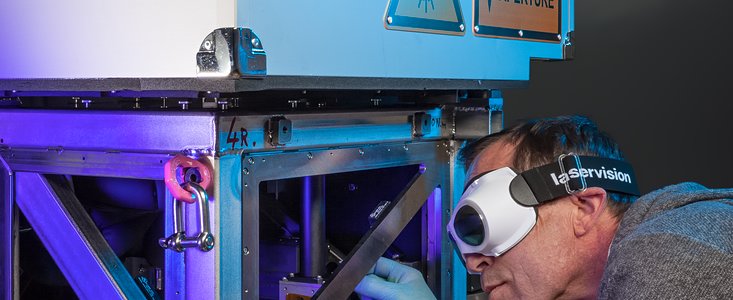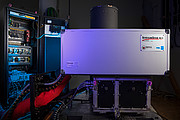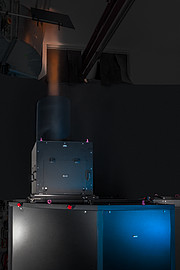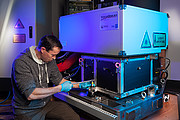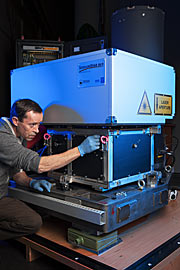Announcement
Laser Guide Star Units Accepted and Shipped to Chile
Four Laser Guide Star Facility passes key milestone
27 November 2015
All four laser guide star units that form the Four Laser Guide Star Facility — a core part of the Adaptive Optics Facility (AOF) for ESO’s Very Large Telescope — have now been accepted and are being shipped to Chile. This is a major step towards establishing VLT Unit Telescope 4 as a fully adaptive telescope with much enhanced image quality.
An adaptive optics system uses sensors to analyse the atmospheric turbulence and a deformable mirror integrated in the telescope to correct for the image distortions caused by the atmosphere. But a bright point-like star very close in the sky to the object being studied is essential, so that the turbulence can be accurately characterised.
Finding a natural star in the right place for this role is unlikely. So, to make the correction of the atmospheric turbulence possible everywhere in the sky, for all possible science targets, an artificial star is needed. Such stars can be created by projecting a powerful laser beam into the sky onto the sodium layer, where it creates a bright glow that appears star-like from the ground.
By measuring the atmospherically induced motions and distortions of this artificial star, and making tiny adjustments to the deformable secondary mirror one thousand times per second, the telescope can produce images with much greater sharpness than is possible without adaptive optics.
The first Adaptive Optics Facility laser guide star unit was installed on the VLT and successfully tested in situ earlier this year. These tests have confirmed the sound design implemented by ESO, in collaboration with European industry and scientific institutes [1]. Tests on VLT Unit Telescope 4 in Chile showed high optical quality, providing an almost perfect artificial star image, and high efficiency of the sodium layer excitation. These successes mean that the team can proceed with preliminary tests with GRAAL, the adaptive optics module feeding HAWK-I, the wide-field imager on Unit Telescope 4; all further steps towards the full commissioning of the Adaptive Optics Facility at Paranal.
The Adaptive Optics Facility will use four lasers simultaneously, which will allow better characterisation of the atmosphere’s properties — and hence a larger field of view where the image is corrected — than is possible with just one laser.
When fully installed, the Adaptive Optics Facility will feed light into two instruments, HAWK-I (in conjunction with GRAAL) and the integral field spectrograph, MUSE, (in conjunction with GALACSI).
Notes
[1] The companies involved include: TOPTICA, Germany; TNO, The Netherlands; MPB Communications, Canada; Optec, Italy; Astrel, Italy; and Laseroptik, Germany. In addition INAF–Osservatorio di Roma, Italy has made significant contributions to the project.
Links
- More information about the laser
- More information about the deformable secondary mirror
- More information about the laser launch telescope
Contacts
Domenico Bonaccini Calia
ESO
Garching bei München, Germany
Tel: +49 89 3200 6567
Email: dbonacci@eso.org
Wolfgang Hackenberg
ESO
Garching bei München, Germany
Tel: +49 89 3200 6782
Email: whackenb@eso.org
Richard Hook
ESO, Public Information Officer
Garching bei München, Germany
Tel: +49 89 3200 6655
Cell: +49 151 1537 3591
Email: rhook@eso.org
About the Announcement
| Id: | ann15089 |
Our use of Cookies
We use cookies that are essential for accessing our websites and using our services. We also use cookies to analyse, measure and improve our websites’ performance, to enable content sharing via social media and to display media content hosted on third-party platforms.
ESO Cookies Policy
The European Organisation for Astronomical Research in the Southern Hemisphere (ESO) is the pre-eminent intergovernmental science and technology organisation in astronomy. It carries out an ambitious programme focused on the design, construction and operation of powerful ground-based observing facilities for astronomy.
This Cookies Policy is intended to provide clarity by outlining the cookies used on the ESO public websites, their functions, the options you have for controlling them, and the ways you can contact us for additional details.
What are cookies?
Cookies are small pieces of data stored on your device by websites you visit. They serve various purposes, such as remembering login credentials and preferences and enhance your browsing experience.
Categories of cookies we use
Essential cookies (always active): These cookies are strictly necessary for the proper functioning of our website. Without these cookies, the website cannot operate correctly, and certain services, such as logging in or accessing secure areas, may not be available; because they are essential for the website’s operation, they cannot be disabled.
Functional Cookies: These cookies enhance your browsing experience by enabling additional features and personalization, such as remembering your preferences and settings. While not strictly necessary for the website to function, they improve usability and convenience; these cookies are only placed if you provide your consent.
Analytics cookies: These cookies collect information about how visitors interact with our website, such as which pages are visited most often and how users navigate the site. This data helps us improve website performance, optimize content, and enhance the user experience; these cookies are only placed if you provide your consent. We use the following analytics cookies.
Matomo Cookies:
This website uses Matomo (formerly Piwik), an open source software which enables the statistical analysis of website visits. Matomo uses cookies (text files) which are saved on your computer and which allow us to analyze how you use our website. The website user information generated by the cookies will only be saved on the servers of our IT Department. We use this information to analyze www.eso.org visits and to prepare reports on website activities. These data will not be disclosed to third parties.
On behalf of ESO, Matomo will use this information for the purpose of evaluating your use of the website, compiling reports on website activity and providing other services relating to website activity and internet usage.
Matomo cookies settings:
Additional Third-party cookies on ESO websites: some of our pages display content from external providers, e.g. YouTube.
Such third-party services are outside of ESO control and may, at any time, change their terms of service, use of cookies, etc.
YouTube: Some videos on the ESO website are embedded from ESO’s official YouTube channel. We have enabled YouTube’s privacy-enhanced mode, meaning that no cookies are set unless the user actively clicks on the video to play it. Additionally, in this mode, YouTube does not store any personally identifiable cookie data for embedded video playbacks. For more details, please refer to YouTube’s embedding videos information page.
Cookies can also be classified based on the following elements.
Regarding the domain, there are:
- First-party cookies, set by the website you are currently visiting. They are stored by the same domain that you are browsing and are used to enhance your experience on that site;
- Third-party cookies, set by a domain other than the one you are currently visiting.
As for their duration, cookies can be:
- Browser-session cookies, which are deleted when the user closes the browser;
- Stored cookies, which stay on the user's device for a predetermined period of time.
How to manage cookies
Cookie settings: You can modify your cookie choices for the ESO webpages at any time by clicking on the link Cookie settings at the bottom of any page.
In your browser: If you wish to delete cookies or instruct your browser to delete or block cookies by default, please visit the help pages of your browser:
Please be aware that if you delete or decline cookies, certain functionalities of our website may be not be available and your browsing experience may be affected.
You can set most browsers to prevent any cookies being placed on your device, but you may then have to manually adjust some preferences every time you visit a site/page. And some services and functionalities may not work properly at all (e.g. profile logging-in, shop check out).
Updates to the ESO Cookies Policy
The ESO Cookies Policy may be subject to future updates, which will be made available on this page.
Additional information
For any queries related to cookies, please contact: pdprATesoDOTorg.
As ESO public webpages are managed by our Department of Communication, your questions will be dealt with the support of the said Department.
